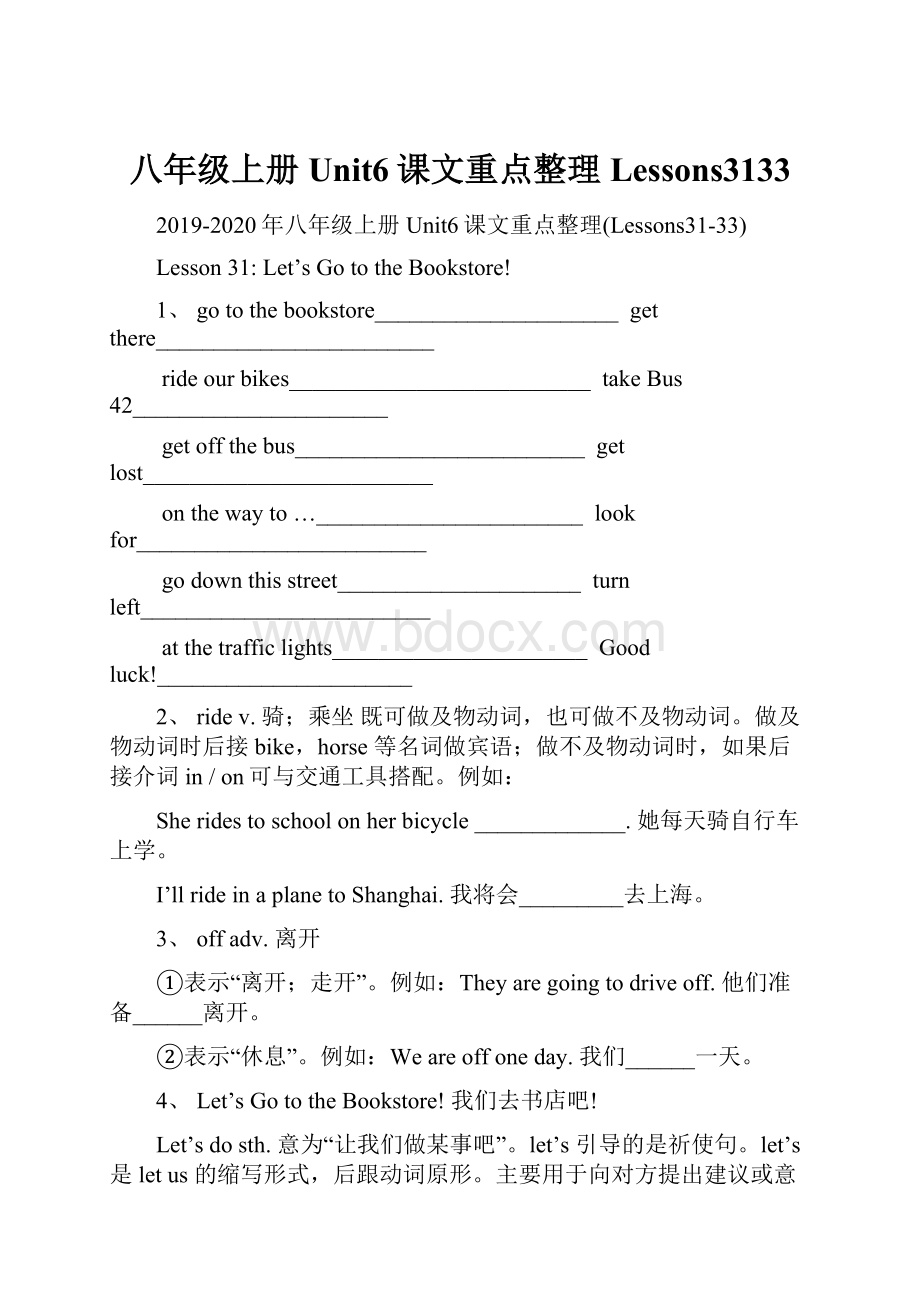 八年级上册Unit6课文重点整理Lessons3133.docx
八年级上册Unit6课文重点整理Lessons3133.docx
- 文档编号:8964677
- 上传时间:2023-02-02
- 格式:DOCX
- 页数:22
- 大小:31.18KB
八年级上册Unit6课文重点整理Lessons3133.docx
《八年级上册Unit6课文重点整理Lessons3133.docx》由会员分享,可在线阅读,更多相关《八年级上册Unit6课文重点整理Lessons3133.docx(22页珍藏版)》请在冰豆网上搜索。

八年级上册Unit6课文重点整理Lessons3133
2019-2020年八年级上册Unit6课文重点整理(Lessons31-33)
Lesson31:
Let’sGototheBookstore!
1、gotothebookstore_____________________getthere________________________
rideourbikes__________________________takeBus42______________________
getoffthebus_________________________getlost_________________________
onthewayto…_______________________lookfor_________________________
godownthisstreet_____________________turnleft_________________________
atthetrafficlights______________________Goodluck!
______________________
2、ridev.骑;乘坐既可做及物动词,也可做不及物动词。
做及物动词时后接bike,horse等名词做宾语;做不及物动词时,如果后接介词in/on可与交通工具搭配。
例如:
Sheridestoschoolonherbicycle_____________.她每天骑自行车上学。
I’llrideinaplanetoShanghai.我将会_________去上海。
3、offadv.离开
①表示“离开;走开”。
例如:
Theyaregoingtodriveoff.他们准备______离开。
②表示“休息”。
例如:
Weareoffoneday.我们______一天。
4、Let’sGototheBookstore!
我们去书店吧!
Let’sdosth.意为“让我们做某事吧”。
let’s引导的是祈使句。
let’s是letus的缩写形式,后跟动词原形。
主要用于向对方提出建议或意见。
常用肯定回答为:
Goodidea./Sure./OK./Allright,I’dloveto.否定回答为No,thanks./No,let’s…例如:
Let’stakethesubwaytogothere.咱们_________去那里吧。
Let’s_____________together.让我们一起去上学吧。
5、Howcanwegetthere?
我们怎么到达那里呢?
how意为“怎么样”。
Howcanwegetto…?
常用来询问乘何种交通工具去某地。
答语一般有以下几种:
①“by+交通工具”。
此时的交通工具只能用单数,而且前面不能用冠词或物主代词来修饰。
例如:
Igotowork_________.我乘公共汽车去上班。
②“in/on+交通工具”。
此时交通工具前必须有冠词、名词所有格或形容词性物主代词来修饰。
例如:
Igotowork_____mybike.我骑自行车去上班。
Igotoschool_____myfather’scar.我坐爸爸的车去上学。
③“take/ride/drive+交通工具”。
此时交通工具前面要有冠词、名词所有格或形容词性物主代词来修饰。
例如:
I_______mybiketoschool.我骑自行车去学校。
I_______ataxitothepark.我乘出租车去公园。
④表示“步行”可以用介词短语onfoot或动词walk。
“walk+to+地点名词”表示去某地;walk后接副词时则省略to。
例如:
I_____________everyday.=I____________________everyday.我每天步行去上学。
6、Buttheygetlostonthewaytothebookstore.但是他们在去书店的路上迷路了。
①getlost意为“迷路”,其同义短语还有____________或____________。
②onthewayto…意为“在去某地的路上”。
当地点为home/here/there等副词时,______省略。
例如:
Tompickedupapurseonhiswayhere.__________________________________________
7、DannyandJennygetoffthebus.丹尼和詹妮下了公交车。
getoff意为“下车”,其反义短语为geton“上车”,一般指大型的车辆或比人高的车,如bus,train,plane等;若小型交通工具则用getinto“上车”和getout(of)“下车”。
例如:
Bruce__________thebusandsatbesideNancy.布鲁斯上了公交车,坐在了南希的旁边。
Whendidyou__________thetaxithismorning?
你今天早晨是什么时候上出租车的?
△、单项选择。
①________herwayhome,LiuMeihelpedalostchildfindhismother.
A.ByB.InC.AtD.On
②—Howdoyougotoschool?
—I________toschool.
A.onfootB.walkC.ridebikeD.walks
③Thelittlegirl________inthebigforestyesterday.
A.loseB.lostC.gotlostD.loseherway
④Hecomeshere________hisbike.
A.byB.onC.atD.in
⑤—________doesyourmothergotowork?
—Bybus.
A.WhatB.HowC.WhereD.Howmany
△、完成句子:
根据所给汉语完成下列各句。
①约翰走路去书店。
John________tothebookstoreonfoot.=John________tothebookstore.
②你们每天怎么去学校?
________doyougotoschooleveryday?
③我们正在找购物中心。
Weare________________theshoppingmall.
④直走你就能看见超市。
Go________andyoucanseethesupermarket.
⑤你能告诉我去图书馆的路吗?
Canyoutellmethe________________thelibrary?
△、完形填空。
Mr.Smith1fromLondon.NowheisinChina.Heis2.Heteaches3
amiddleschool.Heworksveryhard.Hisstudentslike4verymuch.Hecan5alittleChinese.HisstudentsoftenteachhimChinese6Sundays.Mr.Smithlikesplayingfootball.Heoftenplaysfootball7hisstudents.
Mr.Smith8ason.HisnameisJack.Heisastudent.Hestudiesinamiddleschool.Hegoestoschool9bikeeveryday.Hegetsbackhomeatfourintheafternoon.Helikes
10TVintheevening.
1.A.comeB.comesC.areD.coming
2.A.ateacherB.aworkerC.adriverD.afarmer
3.A.onB.inC.ofD.from
4.A.heB.himC.sheD.her
5.A.sayB.speakC.talkD.tell
6.A.atB.onC.ofD.in
7.A.forB.toC.withD.at
8.A.hasB.haveC.thereisD.thereare
9.A.onB.byC.inD.of
10.A.seeingB.lookingC.watchingD.lookingat
Lesson32:
AttheSupermarket
1、freshvegetables_____________________wanttodosth.________________________
lookfor____________________________nextto______________________________
Noproblem.________________________someredT-shirts______________________
overthere__________________________followme____________________________
2、Mrs.Liwantstobuysomefreshvegetables.李夫人想要买一些新鲜的蔬菜。
①buyv.意思是_______,第三人称单数为________,现在分词为__________,buy的反义词是______,意思是________。
②freshvegetables意为“______________”。
fresh此处用作形容词,意为__________,多用来修饰食品或空气。
3、Pleasefollowme.请跟我来。
①followv.意为“跟随;追随”。
常用短语followme,意为“跟我来”,用于给他人指路。
例如:
Followme,I’llshowyoutheway.请跟我来,我来______________。
②follow还可意为“沿着”和“明白”。
例如:
Followthisroad,andthen____________.沿着这条路走,然后向左拐。
Youspeaktoofast,Ican’tfollowyou.你说得太快了,我____________你的话。
4、hundrednum.百
①hundred为数词,意为“百”。
当表示具体的数字时,用“基数词+hundred”表示。
此结构中的hundred必须用单数形式,也不能和of连用。
例如:
Thatwillcostyouabout______________dollars.那大约将要花费你三百美元。
②hundredsof意为“数百的;成百上千的”,表示的是不具体的数量,不能与具体数字连用。
例如:
Therearehundredsofsoldiersintheyard.院子里有数百名_______。
Hundredsofpeopledied____________theearthquake.
由于地震数以百计的人失去了生命。
5、WhatcanIdoforyou?
我能帮你什么忙吗?
此句型也可用Can/MayIhelpyou?
代替,这是营业员、服务员主动向顾客询问的用语,意为“你要买什么”。
如果对方需要帮助,常用Yes,please./Thankyouverymuch./Thanksalot.等回答。
若对方不需要帮助,常用No,thanks.回答。
6、区分excuseme与sorry
①excuseme是人们用于提出请求、询问情况或打断对方时的委婉用语,意为“劳驾,打扰了”。
excuse做名词时有“借口”之意,是可数名词。
如果表示单数,前加不定冠词an。
例如:
Don’tmakeanexcuseforcominglate.别为晚来__________。
②sorry表示因自己的过失而表示歉意,主要用于事后道歉,意为“对不起,请原谅”。
例如:
Sorry,I________myhomeworkathome.对不起,我把作业忘在家了。
7、区分lookfor与find
lookfor与find都有“找”的含义,但lookfor强调“找”的动作和过程。
而find强调“找”的结果,即“找到”或“没找到”。
例如:
Ihave________mybikehereandthere,butIstillcan’t________it.
我已经到处寻找我的自行车了,但还是没找到。
△、单项选择。
1.—________Ihelpyou?
—Yes,Iwanttobuyaskirt.
A.DoB.MayC.AmD.Does
2.Allmyclassmateswant________somethingforthesportsmeeting.
A.doB.doingC.todoD.done
3.—Whatareyoudoing?
—I’m________thekeytothedoor.
A.findingoutB.lookingafterC.lookingforD.finding
4.Pleasesitnext________Billonthesofa.
A.fromB.toC.withD.on
5.—________arethetickets?
—Theyaretwohundredyuan.
A.HowmanyB.HowmuchC.HowdearD.What
△、用方框中选择正确的单词填空(每词限用一次)。
may,show,can,like,watch
1.—Wouldyou________acupoftea?
—Yes,please.I’mverythirsty.
2.—________Igoshoppingwithyou?
—Sure.
3.Let’sgotoamovietheatreto________amovie.
4.Excuseme.I’mlost.Canyou________metheway?
5.What________Idoforyou?
△、完成句子:
根据所给汉语完成下列各句。
1.她想要去公园。
She________________gotothepark.
2.我找不到我的书包了。
I________________myschoolbag.
3.我的书在那边。
Mybooksare________________.
4.我打算去超市购物。
I’mgoingshopping________________________.
△、从下列方框中选择正确选项,补全对话。
A:
1
B:
I’mlookingforapairofshortsformyson.2
A:
I’llshowyou.3Theyareupstairs.Heretheyare.
A.Wherearetheshorts?
B.Howmuchisit?
C.Hereyouare.
D.WhatcanIdoforyou?
E.Thisway,please.
B:
Thispairisverynice.4
A:
30yuan.
B:
5
A:
Thankyouverymuch.
B:
You’rewelcome.
△、用所给单词的适当形式填空。
1.Tony________(have)lunchatschooleveryday.
2.Billlivesnearschoolandhe________(walk)toschool.
3.—Howdoesshe________(go)towork?
—Bybus.
4.She____________(notlike)towalktoschool.
5.Howmany__________(potato)doesshehave?
Lesson33:
Let’sGototheZoo!
1、eatdonuts________________________lookcute____________________________
makenoises_______________________looklonely__________________________
2、Yes.Heisdreaming.是的,他正在做梦。
dreamv.&n.(做)梦;梦;梦想
①dream做及物动词时,后接名词或代词等;做不及物动词,后接宾语时需加介词of/about。
dreamof/aboutsth./doingsth.表示“梦见某物/梦想做某事”。
例如:
Idreamof__________ateacher.我梦想成为一名教师。
Manyyoungpeople______________becomingfamousbasketballplayers.许多年轻人都梦想成为有名的篮球运动员。
②dream也可做名词,表示“梦想;梦”。
haveadream意为“做梦;有一个梦想”。
例如:
Wehavemanydreams.我们有很多梦想。
Hisdreamistobe_________________.他的梦想是成为一名著名的作家。
3、noisen.响声;噪音
表示“喧闹声”时,一般做不可数名词,强调一种声音。
表示各种不同的声音时用noises。
noise也可泛指一般“声音”,既可做可数名词,也可做不可数名词。
例如:
Iwaswokenbythenoiseofacarstartingup.我被汽车的__________吵醒了。
4、Helookslonely!
他看起来很孤独!
区分lonely和alone
两者都有“孤独”的意思。
lonely为形容词,既可做表语,也可做定语,强调一种主观的感觉,表示“感到孤独”。
alone做形容词时只做表语,往往指客观上的孤独,指一个人或一个物;alone做副词时,指“独自地,单独地”。
例如:
Theoldmanlives________,buthedoesn’tfeel________becausehehasmanyfriends.
这位老人一个人住着,但是他不感到孤独,因为他有许多朋友。
△、单项选择。
1.I’m________thetree,butIcan’t________anybirdsinit.
A.lookingat;seeingB.seeing;lookingat
C.lookingat;seeD.seeing;lookat
2.He________badlyill.Hedoesn’twanttoeatanything.
A.looksB.islookingC.islookedD.waslooked
3.I’mnotsure.Perhapsyou’reright.
A.MustbeB.MaybeC.MaybeD.Must
4.LiMingleftherelastyear.NowI________himverymuch.
A.wantB.wouldlikeC.missD.like
5.—________doelephantslive?
—Theyliveinaforest.
A.HowB.WhatC.WhoseD.Where
△、完形填空。
DearBill,
Howareyou?
1verynice2youtowritetome.Letme3somethingaboutmylifeinChina.Ithinkyou4toknowit.IliveinLiLei’shome.Heismy5.Hisfatherandmotherarebothteachers.Theirhouseisn’tbig.Allofthemareveryfriendlytome.TheyteachmeChinese6IteachthemEnglish.
NowI7withtheminChinese.ButIcan’t8verywell.Chineseisveryhardtolearn,Ithink.Mrs.LioftenteachesmehowtocookChinesefood.Hmm!
HowmuchIlikeChi
- 配套讲稿:
如PPT文件的首页显示word图标,表示该PPT已包含配套word讲稿。双击word图标可打开word文档。
- 特殊限制:
部分文档作品中含有的国旗、国徽等图片,仅作为作品整体效果示例展示,禁止商用。设计者仅对作品中独创性部分享有著作权。
- 关 键 词:
- 年级 上册 Unit6 课文 重点 整理 Lessons3133
 冰豆网所有资源均是用户自行上传分享,仅供网友学习交流,未经上传用户书面授权,请勿作他用。
冰豆网所有资源均是用户自行上传分享,仅供网友学习交流,未经上传用户书面授权,请勿作他用。


 1212中级汽车维修工考试试题三.docx
1212中级汽车维修工考试试题三.docx
